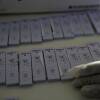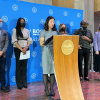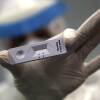Updated at 11 a.m. Dec. 13
As Boston announces plans to distribute at-home COVID-19 tests to some of the city's most vulnerable communities, the CDC recommends the tests before indoor gatherings, and the federal government works out a plan for insurance companies to reimburse people for buying them, it may seem like rapid antigen tests have finally captured the attention of public officials — long after public health experts stressed the crucial role they could play in controlling the pandemic.
But as the attention suddenly being paid to rapid antigen tests increases demand, they remain in short supply on store shelves. And some experts say the recent slate of policies and guidelines around at-home testing might be too little, too late.
"Everyone should have access to COVID-19 testing,” Dr. Bisola Ojikutu, the executive director of the Boston Public Health Commission and head of Mayor Wu’s newly-created COVID-19 Advisory Committee, told GBH News. With the city’s test positivity rate surging to 5.2%this week, officials announced a plan to distribute 20,000 free rapid antigen tests to neightborhoods hit hardest by the pandemic.
“We wanted to start with this 20,000 and we have the ability to scale up from there. We plan to,” Ojikutu said. “In some communities, folks are not using these home rapid tests and I think that they are a reasonable mitigation strategy that can be very useful, particularly in the holiday season when people are gathering. People can test themselves in advance and it gives you knowledge and you can use that knowledge to, you know, understand your risk and not engage in activities that would put others at risk."
The Boston plan comes in the same week that the CDC updated its recommendationsto include taking rapid antigen tests before joining indoor gatherings with people from other households — guidance that many have been seeking ahead of the upcoming holidays.
But the tests, which first became commercially available in the United States last spring, remain in short supply. Many pharmacies in and around Boston are currently sold out.
"They are hard to find, especially when demand on them increases,” said Stephen Kissler of the Harvard T.H. Chan School of Public Health.
“At the beginning of the school year and before the holidays, a lot of people want them,” Kissler went on. “I've tried to buy some myself, and they can be hard to find.”
And even if test kits are on the shelves, they’re an expensive purchase — especially for a product that customers would ideally use on a regular basis to reduce infection risk, Kissler said. Abbott’s BinaxNOW test is the market leader in the U.S. and sells for about $25 for a box of two tests.
"The BinaxNOW test is being sold in Europe under a different name, called Panbio, for a fraction of the price of what it's being sold here in the U.S.,” said Zoe McLaren, a health economist and associate professor of public policy at the University of Maryland Baltimore County. “So the market forces, when there are a limited number of tests on the market, are not beneficial to the consumer.”
The tests aren’t expensive to make, Kissler said.
"Once you have the technology down, it's sort of just like printing something on paper and generating many of them,” he said. “A lot of these tests are produced here in the United States, and we're shipping a lot of them overseas to countries that are using them much higher volumes like the UK and Germany. And so for me, it's been an immense frustration to not be able to find them in huge numbers at local drugstores."
A rapid antigen test developed by the Cambridge-based start-up E25Bio, for example, is still awaiting approval from the U.S. Food and Drug Administration, but is currently being sold internationally.
The Biden administration said last week it's working on a plan for insurance companies to reimburse people for purchasing the tests. The details of that plan aren’t expected to be announced until mid January.
In a written statement, a spokesperson for Blue Cross Blue Shield emphasized the insurance company’s commitment to COVID testing.
“We remain steadfast in our commitment to the health of Americans as the pandemic endures. Continued access to both vaccines and testing is a key piece of that,” the spokesperson said. “The Blue Cross Blue Shield Association will work with the administration to ensure commonsense implementation across all stakeholders, with consumer affordability as our first priority.”
Some public health experts worry, though, that the Biden administration’s plan is coming too late, and won’t provide enough access to be successful at reducing the spread of the virus.
“We won't even find out about it until January 15,” McClaren said. “That is when you're going to have missed all of the holiday season, all of the spread of omicron in the U.S., and potentially a large surge that we will have missed the opportunity to prevent.”
Going through insurance companies, McLaren said, also adds additional barriers, especially for those who are uninsured. It also requires an initial investment by people, and a potentially complicated reimbursement process.
“We're still waiting to know whether the insurance requirements will need a doctor's prescription or recommendation for rapid tests, and what the steps will be to allow it to be reimbursed,” she said. “And then also, as everybody knows, with insurance reimbursements, there's no guarantee that the outlay will be reimbursed.”
In the United Kingdom, the government is offering free tests. Each day, a person can obtain one free pack of seven tests.
By contrast, McLaren pointed to an exchange during a White House briefing on Tuesday, in which press secretary Jen Psaki was dismissive of a program like that. Psaki said the insurance reimbursement plan would provide free tests to 150 million Americans.
“That’s kind of complicated, though. Why not make them free, and have them available everywhere?" asked NPR reporter Mara Liasson.
"Should we just send them to every American?" Psaki replied with a smile.
“Maybe?” Liasson responded.
“Then what happens if every American has one test?” Psaki asked. “How much does that cost, and then what happens after that?”
For McLaren, the benefit the tests could have for public health and the economy outweigh those costs.
“The pandemic is costing us billions of dollars,” McLaren said. “And it would [cost] a small fraction of that… [to] flood the market with rapid tests.”
This story was updated to correct how often people in the U.K. can get free tests.









